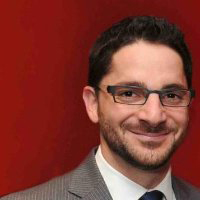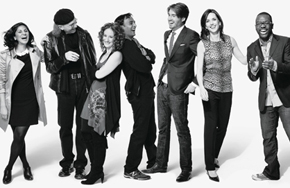Ari Wallach, 37, heads a consulting firm that draws power from an eclectic mix of unconventional experts. Resolving conflict through discourse is the theme of a career spanning politics, commerce, and religion.

As the founder of Synthesis, a strategic consulting firm based in D.C. and New York, Ari Wallach helps government, NGO, and corporate clients--including CNN, the Ford Foundation, the U.S. State Department, and United Nations Refugee Agency--find innovative solutions to complex problems. For the student of political philosophy who once considered going to rabbinical school, synthesis--resolving seemingly incompatible views and experiences--has been the theme running through his eclectic career that's ranged from conflict resolution at UC Berkeley, to finance work with the Democratic National Committee, new-media projects, consulting with the nonprofit Coro Foundation, and the "Great Schlep" campaign to get out the Jewish vote for Obama in 2008.
FAST COMPANY: How is Synthesis different from other, bigger consulting firms?
ARI WALLACH: All Synthesis is, is myself and my partner running the back end. It's like cloud innovation; we're really trying to build a next-generation consultancy, drawing on a different kind of expert network. All the rock stars I know now are freelancers and perma-lancers, but there's no mechanism for them to work together as teams--for a few days or a year or two. We're working to figure out the infrastructure for this kind of organization.
We'll hire a stay-at-home mom who doesn't want to return to a position at McKinsey, but will give us 15 brilliant hours a week in between everything else she's doing in her life. We can bring in an urban-graffiti practitioner or someone who builds amazing shelters at Burning Man and used to build DARPA-contract structures and get them to reframe what they do so it's relevant to a client's issues. We don't have a one-size-fits-all process like other consulting firms have. It's like going to a Freudian or Jungian therapist--I'm more comfortable with the gestalt school. We bring a lot of curation--knowing what fits but also what doesn't fit. We also have a heavy reliance on academics--especially in anthropology and social psychology.
How does your experience in conflict resolution inform your consulting work?
There is a false premise that innovation is about ideas. But ideas are actually relatively simple to come up with. True innovation is about culture and execution. The heart of innovation is conflict--you are challenging the status quo. Another thing I learned from working on conflict resolution throughout high school and college is that the problem you're talking about is usually not really the problem. We often end up solving something that wasn't part of the original brief. That's why it's important to bring diverse skills and beliefs and not write anything off.
Where does your interest in conflict come from?
I grew up in a home steeped in conflict, watching black-and-white World War II movies on TV. My father was a Holocaust survivor whose father was shot in front of him and whose sisters and mothers were sent to Auschwitz. He escaped under gunfire and fought with the Jewish underground in Poland. He'd been in Cuba for 11 years during the revolution, where speaking Spanish and Russian was a real advantage. But my mom is a professional artist whose teacher was Buckminster Fuller, so as very young kid I was exposed to that. Trying to reconcile what that meant to what happened in WWII, and preventing that from happening again--there you have the underlying thesis of my life.
Did your upbringing also influence your desire to seek out diverse perspectives?
I had an eclectic upbringing, to say the least. My two older sisters and I were born in Guadalajara, where my dad ran a successful pipe business. My dad spoke 11 languages by the time he passed away 17 years ago. In San Francisco, I remember going to restaurants in the '80s and he'd disappear--he'd be back in the kitchen talking with the staff in Spanish. From that, I learned that everyone is a source.
About Generation Flux Pioneers of the new (and chaotic) frontier of business Flagship Fluxers, Photo: Brooke Nipar
Flagship Fluxers, Photo: Brooke Nipar
In our February 2012 issue Fast Company Editor Robert Safian identified a diverse set of innovators who embrace instability, tolerate--and even enjoy--recalibrating careers, business models, and assumptions. People like author/Onion digital media maverick Baratunde Thurston, Greylock Data Scientist DJ Patil, Microsoft Senior Researcher danah boyd, and GE's Beth Comstock. This series continues to explore the new values of GenFlux. Find more Fluxers here. And tweet your contributions using #GenFlux.
What's motivated you to keep trying new things?
Figuring out what you don't want to do is as important as figuring out what you do want to do. As I was exposed to different things and seen the trade-offs, I've opted out. I've gone through the entire bucket list of everything I thought I wanted to do when I was growing up. When I was 18 I was in the hospital in a body cast. I did medical rounds with my doctor and saw that I wasn't interested in the mundane part of working in a hospital. I spent time in an architecture firm and saw how much time you needed to put in as an apprentice to get to Gehry level.
By the time I left school, I'd done time with the Clinton-Gore camp and a think tank in DC. I knew I didn't want do presidential campaigns or work in a think tank. In the mid-90s, I founded a startup called InForum--a live-events forum for Gen-X politics--which grew to be pretty big in the Bay Area. After that, I went to New York and worked with the nonprofit Coro Foundation--an externship program based on the medical rotation model--where I worked as a consultant with the Loews Hotel Group, the Rev. Al Sharpton, and New York's largest public-employee union, rotating through different stakeholders in civic matters. Half of the people in New York City government are Coro alumni. That really laid the groundwork for the business model of Synthesis. After Coro, I unsuccessfully tried to get funding for a Gen-X Charlie Rose-style TV called ReThink. After that, I went on to do some consulting and corporate business development.
How did the Great Schlep lead you into starting your own firm?
During the 2008 campaign, it became obvious that Obama had a perception problem with Jewish voters. I had a good idea of what needed to be done, but it was outside of the campaign brand playbook--something more politically dangerous but with a huge potential upside. Using raw humor--Sarah Silverman made video for us--and guilt, the Great Schlep was about mobilizing young Jewish Obama supporters, largely through social media, to get out the elderly Jewish vote by actually going to places like Florida where their grandparents lived. After that campaign, I got several calls from Fortune 500 firms looking for Chief Innovation Officers. I was really torn about what to do next and got connected with an executive coach--even doing what I do, you still need to go to someone else to do for you what you do for others. Talking with him, I came to the realization that I didn't want to work for anyone ever again. He said, "It sounds like you want to build a consulting shop and turn some of these job offers into clients."
Do you consider yourself a risk-taker?
People from outside might see me as a risk-taker, but I'm actually very conservative--even more so now that I am married with 3-year-old twin daughters. Restlessness and curiosity are driving forces for me, and I always want to be learning from what I'm doing. But I've always known that this is my life, so I've saved up for exploration--some of the things that you don't see on LinkedIn, like a residency at Green Gulch, the Zen monastery in Marin Country; or going to Santa Barbara to learn how to surf; or doing PR for Deepak Chopra on a book tour, where I learned individual branding.
Is it possible for everyone to have the kind career you have, though?
In 2012, no. The model of an evolving career is not possible for everyone. I went to state school and had no student debt. I did well at a couple of dot-coms. I'm a big fan of internships--I would love to see a formally instituted "gap year" for graduates, where you could rotate through diverse fields and learn about them very quickly. We don't live in a culture where we go out and ask people to teach us what they do, and we've done away with the kinds of mentorships and rotations that would let people get the flux-iness out of our system without so much risk.
Are you done job-hopping?
I'm working with all kind of clients--my day might include a meeting with imams and reverends, then getting on a video link with Geneva to talk about building shelters in Nairobi, and discussing national security issues. I'm thinking, wow, this is really cool. What appeals to me are big, Talmudic-level ideas that give you a lot to wrestle with and work with. This is it for years to come.
Read about other members of Generation Flux:
Adobe's Corporate Culture Through The Lens Of A Documentary Filmmaker MyEnergy CEO Ben Bixby's Eureka Moment Literally Involved A Light Bulb How IBM's Big Data Guy Found A Career In Chaos
[Image: Flickr user Iversen Rönnlund]